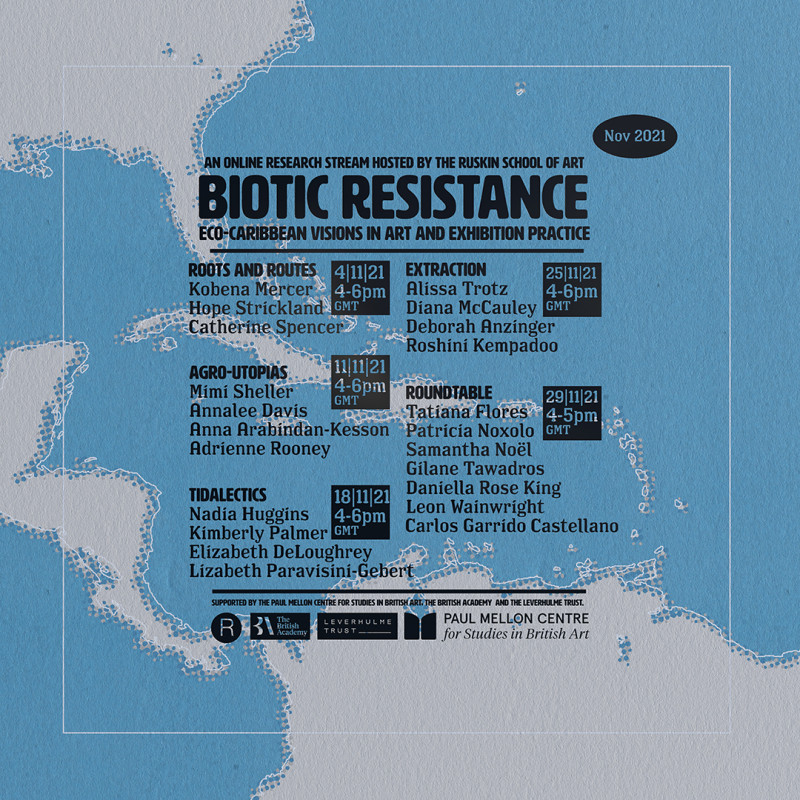Latest News
New book! Caribbean Eco-Aesthetics Anna Barham at Badischer Kunstverein Pink Pandemonium at Meadow Lane Playing Fields! John Newberry Onyeka Igwe wins Jarman Award 2025 Ian Kiaer presents new solo exhibition in Los AngelesBiotic Resistance: Eco-Caribbean Visions in Art and Exhibition Practice
As John Ruskin's 150th Anniversary approaches, Dr Giulia Smith and Dr Kate Keohane have organised a series of seminars devoted to exploring the intersection of art, literature, and environment in the transnational Caribbean.
Seminars will run on Zoom every Thursday between 16:00 - 18:00 GMT throughout November 2021, with a concluding roundtable on Monday the 29th from 16:00 - 17:00.
To register please see here. For more information see here

Biotic Resistance: Eco-Caribbean Visions in Art and Exhibition Practice is an online research series devoted to exploring the intersection of art, literature, and environment in the transnational Caribbean. The event is jointly organised by the Ruskin's Leverhulme Early Career Research Fellows, Dr Giulia Smith and Dr Kate Keohane. A central objective is to highlight the role that artists and thinkers with Caribbean heritage have played in shaping a planetary consciousness that is uniquely suited to thinking through the ecological emergencies of the present.
Importantly, the series is not bound by chronological focus, but supports research that draws transhistorical connections between the colonial era, the period of independence and the contemporary. The climatic phenomena that currently make the Caribbean one of the most ecologically vulnerable regions in the world are inextricable from the history of this region as a site of colonial extraction and exploitation.
Starting in the fifteenth century, the European colonisation of the Caribbean initiated one of the most dramatic shifts in the ecological organisation of the planet, so much so that some have taken the conquest of the Americas to mark the beginning of the Anthropocene. Never before had the world witnessed such a monumental operation of transoceanic transplantation: soils, seeds, animals and humans were shipped to the Caribbean from every corner of the world; while the region’s native resources were fed into an exponentially growing trade in tropical goods. Pivoting on the economy of the plantation, this violently exploitative traffic in both animate and inanimate commodities underpins the development of the phenomenon art historians call ‘modernity’ (‘plantationocene’ for Donna Haraway and others) and epitomises the centrality of the Caribbean in the formation of a globally connected market with irreversible anthropogenic effects on the planet.
Today, as the Caribbean remains at risk of devastating forms of neo-colonial resource extraction, growing numbers of artists and scholars are turning to the politics of ecology to advocate for the region’s effective decolonisation as well as for more sustainable futures for the world at large. This vindication of the Caribbean as a frontline of planetary survival has prompted a reassessment of the work of historic authors and artists (from Sylvia Wynter to Èdouard Glissant, from Aubrey Williams to Wifredo Lam and Everald Brown) who placed the natural world at the forefront of the struggle against colonialism. ‘Biotic Resistance: Eco-Caribbean Visions in Art and Exhibition Practice’ takes stock of these invaluable theoretical and activist engagements, and reflects upon their implications through a transdisciplinary approach to art history.
Biotic Resistance: Eco-Caribbean Visions in Art and Exhibition Practice is supported by the British Academy, Leverhulme Trust, and the Paul Mellon Centre for Studies in British Art.
The series is hosted the Ruskin School of Art, University of Oxford.


